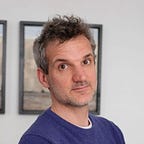Wittgenstein: Intelligence is Never Artificial
Why Extravagant Claims About AI Cheapen Our Humanity
“What is going to be created will literally be a god,” Anthony Levandowski, the leader of a religion called “Way of the Future” told Wired Magazine. “It’s not a god in the sense that it makes lightning or causes hurricanes. But if there is something a billion times smarter than the smartest human, what else are you going to call it?”
Levandowski considers himself a prophet of artificial intelligence (AI). His newly-founded cult anticipates the presumed god-like power of technology. This case of techno-idolatry may be extreme, but if they didn’t believe it was possible now, most people would believe that artificial intelligence will arrive in the near future.
The popular understanding is that AI will be able to think like a human and interact with human beings in a way that might be indistinguishable from a real human being.
This level of sophistication is most often described as “Strong AI”. The technological development that computers will someday match our cognitive abilities — and even become self-aware — already has its own mythology.
The coming of Strong AI has been labelled as “the singularity”, an event of unprecedented magnitude for the human race. Some see it as the…
